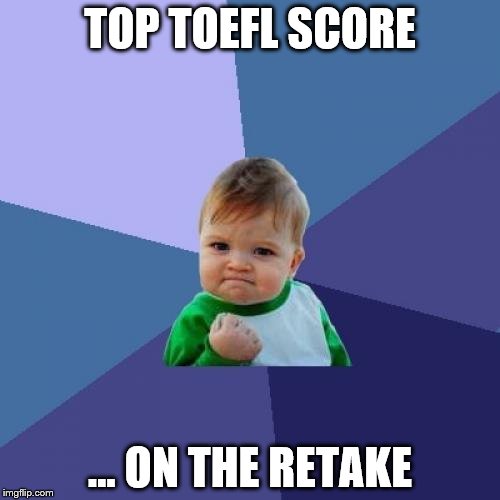
It happened. You didn’t get the TOEFL score you needed. Take heart! I’m about to tell you how to study for a TOEFL retake successfully.
How to Study for a TOEFL Retake, Step 1: Assess What Went Wrong
The TOEFL is scored section-by-section. Look at your individual section scores. If you scored lower in some sections, think about why. Were certain question types harder than others? What kinds of English language skills are the most challenging for you?
Also think about how your study habits and test-readiness may have hurt your score last time. Did you study every TOEFL skill and every aspect of the test sufficiently? Were you well-rested on test day?
How to Study for a TOEFL Retake, Step 2: Assess What Went Right
It’s not uncommon for someone to fail the TOEFL but still do very well on parts of the exam. Knowing your strengths is also important for a successful TOEFL retake.
Suppose, for example, that you did poorly in TOEFL Writing, but got a pretty good score in TOEFL Reading. Reading and writing are closely related skills. You may be able to use your understanding of written passages to improve your own writing. Similarly, good English listening skills can translate into good English speaking skills. If you have a good “ear” for the audio tracks on the TOEFL, you can develop a better ear for your own speech when you study for your TOEFL retake.
How to Study for a TOEFL Retake, Step 3: Make a List of What you Need to Study
Once you’ve looked at your strengths and weaknesses from your last testing session, it’s time to make a plan. List the skills you most need to improve. Also list the aspects of TOEFL that you feel confident about and can build on when you study for your retake.
How to Study for a TOEFL Retake, Step 4: Decide How Much Time to Give Yourself
For many students, this is the trickiest part of studying for a TOEFL retake. Often, fast-approaching university application deadlines are an important consideration. You need to ask yourself if you have time for a TOEFL retake.
You may find you have just a few weeks to retake the TOEFL. But can you really get through everything in your “to study” list that quickly? If you’re not sure, then you have a choice to make. You can study for a shorter-than-ideal period. Or you can study for as long as you need to. This second option increases the risk of missing an application deadline and delaying your studies. But it could give you a better chance at getting a top TOEFL score the next time around.
How to Study for a TOEFL Retake, Step 5: Make a Study Schedule, and Carry it Out
At this point, you know what your strengths and weaknesses are and you know what you need to study. You know how much time you have to study before your retake. Now you can organize all of that information into a specific plan.
There are a lot of good planning resources online. Magoosh offers several different TOEFL study plans and guides. If you’re a premium Magoosh TOEFL subscriber, you can follow our study plans exactly as they’re written. If not, these plans can be modified to create a study schedule that meets your needs.
When you’re ready to carry out your study plan, check out our video on how to study effectively:
How to Study for a TOEFL Retake, Step 6: Be Well Rested, Well Fed, and Well-Focused on Test Day
Remember what I said at the beginning of this post about figuring out if you were really test-ready the last time? If you weren’t test-ready, don’t let it happen again. And if you were test-ready, don’t be unprepared on the retake. Instead, be more ready than ever!






Leave a Reply